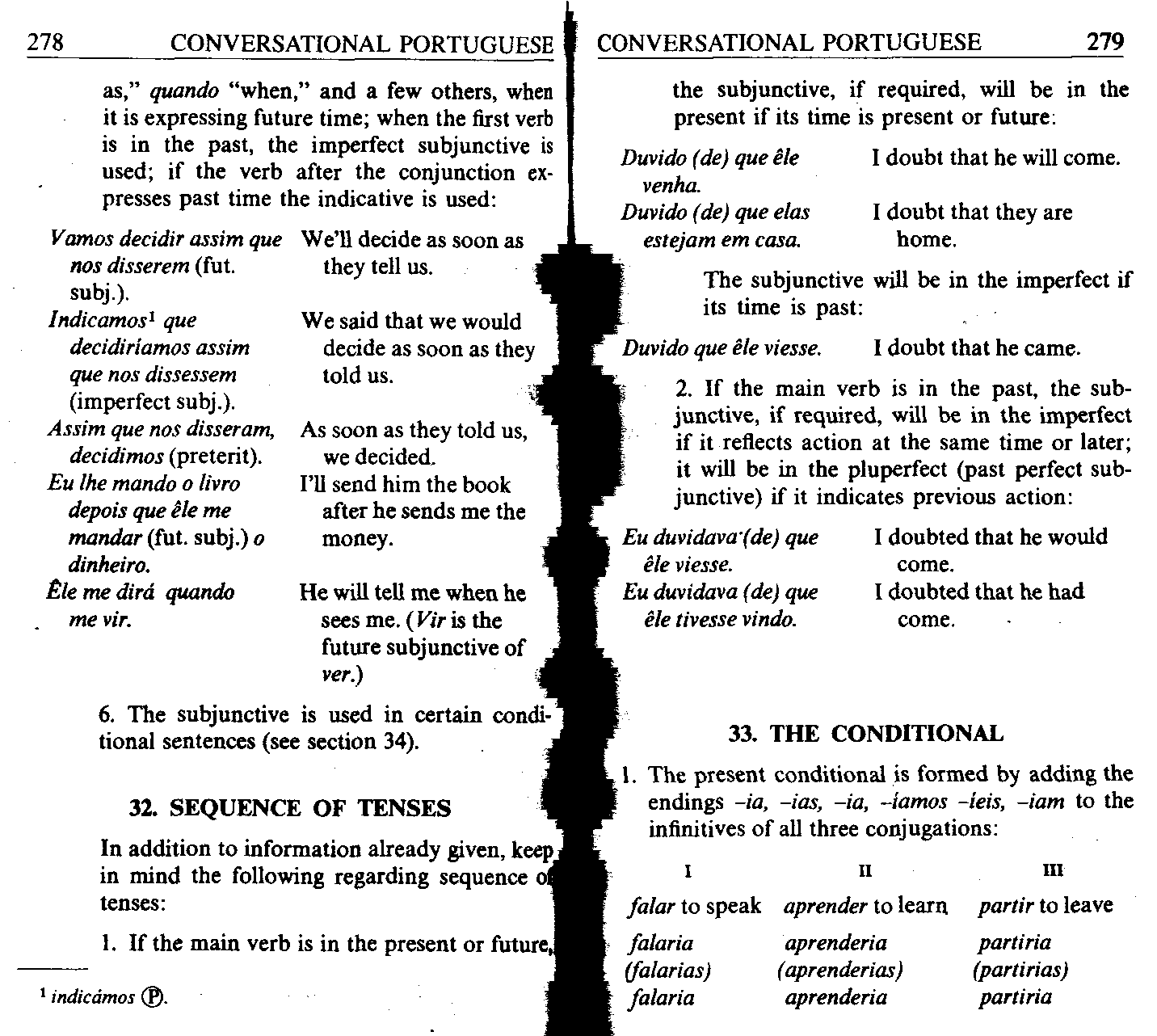Summary p278

278
CONV ERSATIONAL PORTUGUESE
,
as,” ąuando “when,” and a few others, when it is expressing futurę time; when the first verb is in the past, the imperfect subjunctive is used; if the verb after the conjunction ex-presses past time the indicative is used:
Vamos decidir assim ąue nos disserem (fut. subj.).
Indicamos1 ąue
decidiriamos assim ąue nos dissessem (imperfect subj.).
Assim ąue nos disseram, decidimos (preterit).
Eu Ihe mando o livro depois ąue Sie me mandar (fut. subj.) o dinheiro.
źle me dird ąuando me vir.
We’U decide as soon as they tell us.
We said that we would
decide as soon as they told us.
As soon as they told us, we decided.
PU send him the book after he sends me the money.
He wiU tell me when he sees me. (Vir is the futurę subjunctive of ver.)
6. The subjunctive is used in certain condi-tional sentences (see section 34).
32. SEQUENCE OF TENSES
In addition to Information already given, keepj in mind the following regarding seąuence tenses:
1. If the main verb is in the present or futuręj
1 indicamos (P).
CONYERSATIONAL PORTUGUESE
279
the subjunctive, if reąuired, will be in the present if its time is present or futurę:
I doubt that he will eonie.
Duvido (de) ąue ele venha.
I doubt that they are home.
Duvido (de) ąue ełas estejam em casa.
The subjunctive will be in the imperfect if its time is past:
Duvido ąue ele \iesse. I doubt that he came.
2. If the main verb is in the past, the sub-junctive, if reąuired, will be in the imperfect if it reflects action at the same time or later; it will be in the pluperfect (past perfect sub-junctive) if it indicates previous action:
Eu duvidava'(de) ąue ele viesse.
Eu duvidava (de) ąue ele tivesse vindo.
I doubted that he would come.
I doubted that he had come.
33. THE CONDITIONAL
The present conditional is formed by adding the endings -ia, -ias, -ia, -iamos -ieis, -lam to the infinitives of all three conjugations:
iii
partir to leave
partiria
(partirias)
partiria
ii
falar to speak
falaria
(falarias)
falaria
aprender to learn
aprenderia (aprenderias) aprenderia
Wyszukiwarka
Podobne podstrony:
the bagasse of 7738 ± 100 kj/kg, as received. However, in most sugar mills, it is not possible to ca
UHAM019 2 ^ UNDERSTANDING HEADACHES AND M I G RAI N ES so it is with headaches. They differ in type
generation Systems, such as load insertion and load rejection. However, it must be said that a model
Summary p230 230 CONYERSATIONAL PORTUGUESE 3, The cedilla (cedilha) is used with
Summary p244 1 244_CONVER$ATIONAL PORTUGUESE Common exceptions: adjectives of nationałity, a usual
Summary p268 268 CONYERSATIONAL PORTUGUESE 2. The personal infinitiye has endings which make it ea
Summary p276 276 CONYERSATIONAL PORTUGUESE £ posshel que ele o faęa. It is possible that he will d
Summary p284 284 CONYERSATIONAL PORTUGUESE finał a changed to e and finał e changed to a (but also
Summary Letters p318 318_CONYERSATIONAL PORTUGUESE Ver to see 1. PRES. IND.: vejo, ves, ve, vemo
Summary Letters p320 320 CONYERSATIONAL PORTUGUESE O senhor e a senhora Guimaraes, muito agradeci-
Summary Letters p322 322 CONYERSATIONAL PORTUGUESE CONVERSATIONA L PORTUGUESE 323 2. THANK-YOU NOT
Summary Letters p324 324 CONYERSATIONAL PORTUGUESE A. Lopes, Nunes & Cia. Rua de Madalena, 154
Summary Letters p326 326 CONYERSATIONAL PORTUGUESE 4. INFORMAL LETTERS 2 de feyereiro1 Meu caro Jo
Summary Letters p328 328 CONYERSATIONAL PORTUGUESE 5. USEFUL PHRASES FOR CORRESPONDENCE De ar Sir:
Summary Letters p330 330 CONYERSATIONAL PORTUGUESE CONYERSATIONAL PORTUGUESE 331 B. INFORMAL LETTE
Summary Letters p332 332 CONYERSATIONAL PORTUGUESE Notę: These phrases above amount to “Yours,” “A
więcej podobnych podstron